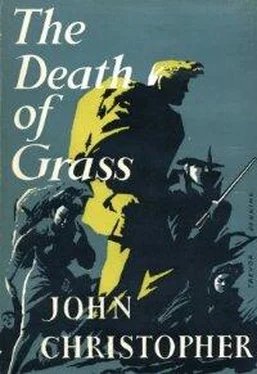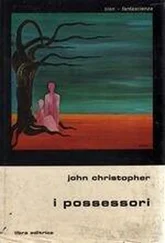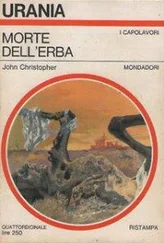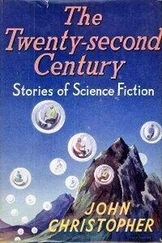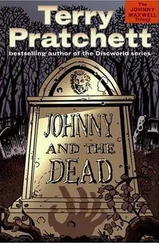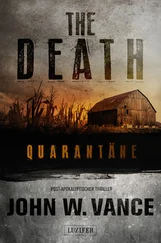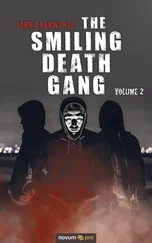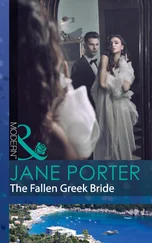He had backed away until his free hand was near the telephone.
Roger said sharply: “Wait a minute. I’ve got something to offer you.”
“I don’t think so.”
“Your life?”
Pirrie’s hand held the telephone handpiece, but had not yet lifted it. He smiled. “Surely not.”
“Why do you think I tried to knock you out? You can’t imagine I would do it if I weren’t desperate.”
“I’m inclined to agree with you on that,” Pirrie said politely. “I should not have let anyone else come so close to overpowering me, but one does not expect desperation in a senior Civil Servant. Not so violent a desperation, at least.”
Roger said: “We have left our families in a car just off the Great North Road. There’s room for another if you care to join us.”
“I understand,” Pirrie said, “that travel out of London is temporarily forbidden.”
Roger nodded. “That’s one reason we wanted the arms. We’re getting out tonight.”
“You didn’t get the arms.”
“Your credit, not my discredit,” Roger said, “and damn well you know it.”
Pirrie removed his hand from the telephone. “Perhaps you would care to give me a brief explanation of your urgent need for arms and for getting out of London.”
He listened, without interrupting, while Roger talked. At the end, he said softly:
“A farm you say, in a valley? A valley that can be defended?”
“By half a dozen,” John put in, “against an army.”
Pirrie lowered the revolver he held. “I had a telephone call this afternoon,” he said, “from the local Superintendent of Police. He asked me if I wanted a guard here. He seemed very concerned for my safety, and the only explanation he offered was that there were some silly rumours about, which might lead to trouble.”
“He didn’t insist on a guard?” Roger asked.
“No, I suppose there would have been the disadvantage that a police guard becomes conspicuous.” He nodded politely to Roger. “You will understand how I chanced to be so well prepared for you.”
“And now?” John pressed him. “Do you believe us?”
Pirrie sighed. “I believe that you believe it. Apart from that, I have been wondering myself if there were any reasonable way of getting out of London. Even without fully crediting your tale, I do not care to be compulsorily held here. And your tale does not strain my credulity as much, perhaps, as it ought. Living with guns, as I have done, one loses the habit of looking for gentleness in men.”
Roger said: “Right. Which guns do we take?”
Pirrie turned slightly, and this time picked up the telephone. Automatically, Roger moved towards him. Pirrie looked at the gun in his hand, and tossed it to Roger.
“I am telephoning to my wife,” he said. “We live in St John’s Wood. I imagine that if you can get two cars out, you can get three? The extra vehicle may come in useful.”
He was dialling the number. Roger said warningly:
“Careful what you say over that.”
Pirrie said into the mouthpiece: “Hello, my dear. I’m just preparing to leave. I thought it might be nice to pay a visit to the Rosenblums this evening—yes, the Rosenblums. Get things ready would you? I shall be right along.”
He replaced the receiver. “The Rosenblums,” he explained, “live in Leeds. Millicent is very quick to perceive things.”
Roger looked at him with respect. “My God, she must be! I can see that both you and Millicent are going to be very useful members of the group. By the way, we had previously decided that this kind of party needs a leader.”
Pirrie nodded. “You?”
“No. John Custance here.”
Pirrie surveyed John briefly. “Very well. Now, the weapons. I will set them out, and you can start carrying them to your car.”
They were taking out the last of the ammunition when a police constable strolled towards them. He looked with some interest at the little boxes.
“Evening, Mr Pirrie,” he said. “Transferring stock?”
“This is for your people,” Pirrie said. “They asked for it. Keep an eye on the shop, will you? We’ll be back for some more later on.”
“Do what I can, sir,” the policeman said doubtfully, “but I’ve got a beat to cover, you know.”
Pirrie finished padlocking the front door. “My little joke,” he said, “but your people start the rumours.”
As they pulled away, John said: “Lucky he didn’t ask what your two helpers were up to.”
“The genus Constable,” Pirrie said, “is very inquisitive once its curiosity is aroused. Providing you can avoid that, you have no cause to worry. Just off St John’s Wood High Street. I’ll direct you particularly from there.”
On Pirrie’s direction, they drew up behind an ancient Ford. Pirrie called: “Millicent!” in a clear, loud voice, and a woman got out of the car and came back to them. She was a good twenty years younger than Pirrie, about his height, with features dark and attractive, if somewhat sharp.
“Have you packed?” Pirrie asked her. “We aren’t coming back.”
She accepted this casually. She said, in a slightly Cockney voice: “Everything we’ll need, I think. What’s it all about? I’ve asked Hilda to look after the cat.”
“Poor pussy,” said Pirrie. “But I fear we must abandon her. I’ll explain things on the way.” He turned to the other two. “I will join Millicent from this point.”
Roger was staring at the antique car in front of them. “I don’t want to seem rude,” he said, “but mightn’t it be better if you piled your stuff in with ours? We could manage it quite easily.”
Pirrie smiled as he got out of the car. “A left fork just short of Wrotham Park?” he queried. “We’ll find you there, shall we?”
Roger shrugged. Pirrie escorted his wife to the car ahead. Roger started up his own car and cruised slowly past them. He and John were startled, a moment later, when the Ford ripped past with an altogether improbable degree of acceleration, checked at the intersection, and then slid away on to the main road. Roger started after it, but by the time he had got into the stream of traffic it was lost to sight.
They did not see it again until they reached the Great North Road. Pirrie’s Ford was waiting for them, and thereafter followed demurely.
They had their suppers separately in their individual cars. Once they were out of London, they would eat communally, but a picnic here might attract attention. They had parked at discreet distances also.
Roger had explained his plan to John, and he had approved it. By eleven o’clock the road they were in was deserted; London’s outer suburbs were at rest. But they did not move until midnight. It was a moonless night, but there was light from the widely spaced lamp standards. The children slept in the rear seats of the cars. Ann sat beside John in the front.
She shivered. “Surely there’s another way of getting out?”
He stared ahead into the dim shadowy road. “I can’t think of one.”
She looked at him. “You aren’t the same person, are you? The idea of quite calmly planning murder… it’s more grotesque than horrible.”
“Ann,” he said. “Davey is thirty miles away, but he might as well be thirty million if we let ourselves be persuaded into remaining in this trap.” He nodded his head towards the rear seat, where Mary lay bundled up. “And it isn’t only ourselves.”
“But the odds are so terribly against you.”
He laughed. “Does that affect the morality of it? As a matter of fact, without Pirrie the odds would have been steep. I think they’re quite reasonable now. A Bisley shot {80} 80 Bisley shot: expert marksman; Bisley is a village in Surrey where the annual meeting of the National Rifle Association is held.
was just what we needed.”
Читать дальше
